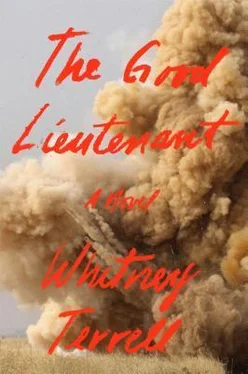“Touch it,” Fowler said.
“Touch what?”
“Touch me, touch Beale, give us a little love, Pulowski.”
He reached up, awkwardly, not wanting to undo his shoulder belt, and brushed the backs of their hands with his fingertips.
“That’s good,” Fowler said. “That’s for Fredrickson and Arthur, who fucking bit it right fucking here. And now, in their honor, we’re going to fix this place.”
“Hooah,” Beale said.
* * *
The traffic was a problem. Fowler could handle the bomb crater, the pile of slag left from the building that had collapsed, but what she hadn’t accounted for were the cabs, mini Nissan pickups loaded with melons, overladen buses, hatchbacks with angry-looking men that zoomed around her platoon’s vehicles as they pulled into the intersection outside Muthanna. So she pretended that she had. She called the battalion and requested four additional Humvees. She established a security perimeter, her Humvee’s.50-cal warning traffic away, then she ordered her platoon to fill the blast hole with gravel and tow away the chassis of the truck that had blown up Fredrickson and Arthur. And what did Pulowski do during these two hours of steady work? Nothing. He slouched around her truck. He unpacked his cameras, fiddled with some wires, and generally acted terrified — which, you know, fine, but so was everybody. It had always been her one weakness, trying to take care of a man who couldn’t take care of himself. You told yourself you were going to change things, then you just kept making the same dumb mistake over and over again. It wasn’t exactly what she’d imagined when the ROTC recruiting officer, Captain Granger, had shown up at her high school wearing dress greens that had been cut so tight that everyone — including, Fowler had noticed, Miss Simmons, her homeroom teacher — could clearly see his biceps through the fabric. That was the kind of officer she’d expected to teach her about life in the Army — energetic, confident, and hard as fucking nails. Instead, she’d gone for the complicated option, the sensitive model, the one that had seemed more interesting, which was how you ended up in a tactical situation that was far more fucked-up than anyone had realized it would be.
More than anything, she resented the way Pulowski had accused her of being responsible for this mission the night before. The whole lecture on how she had the free will to say no, as if the connection between them had never existed. Which was a lie. But then again, so were the arguments she’d used to keep her platoon together, functioning, and in the field. It didn’t help that she got a call from the TOC, informing her that the reinforcements she’d requested had been diverted to provide security for a tour that Colonel Seacourt was giving that day. Or that, hearing this news, her platoon sergeant, Carl Beale, became increasingly nervous, pacing back and forth, scanning the windows of the nearby buildings incessantly. “Why don’t you give me a couple guys, LT,” he said finally, “and let me walk this west perimeter, go in these storefronts? I don’t like them.”
Beale had freckles so thick that in places they blended to solid patterns on his cheeks, and a body that resembled, in its doughiness and the flat-footed way his boots creased at the instep, an old-fashioned power hitter gone to seed. They were standing at the fender of Fowler’s Humvee, which she’d parked in the center of their work site. Pulowski had stopped for a water break a few meters away. “Stick with the plan, Beale,” she said. “We secure this area, we get the T-walls for the new checkpoint up, then we wait for the extra manpower to go in the buildings and get those cameras installed.”
“You knew you were bringing the cameras out. So why didn’t you bring the extra trucks in the first place?”
She knew Beale knew the answer to that. The answer was that neither Pulowski nor McKutcheon had given them an accurate report on how congested and unruly the intersection was going to be. “It’s an unforeseen circumstance, Beale. Okay? But I’m not going to abandon protocol just because you’re nervous, okay?”
“Yeah, well, imagine how you’d feel if you lost somebody just because Pulowski was too much of a pussy to go do his job.”
“It’s not about Pulowski,” she said. “I don’t want to send you in either. Or Waldorf. Or Crawford. Or anybody.”
“You deserve better than that.”
“What?”
Beale was an awkward soldier; he’d never touched her except out in the bean field, when she’d saved him from a fight. But now he grabbed the collar of her body armor and pulled her down into a squat, holding tight. “You laid out for me with Seacourt, didn’t you? Huh? You lay out for me, I lay out for you. How would you feel if we got hit because you spent two hours waiting for backup, just because you wanted to protect Pulowski? He doesn’t have your back, ma’am. Not like we do, anyway.”
She should have let it pass — ignored Beale, made the proper call. Instead what she saw, like the tiny picture she used to get when she turned her father’s binoculars around and looked through them the wrong way, was the image of herself sitting in the recruiter’s car, out front of her father’s house in Junction City, Kansas, signing the papers. All she could see was that image and, along with it, a tight, high pressure in her chest, as if someone were stabbing her in the center of her breastbone with a piece of glass. It had been there ever since they’d left the gate that morning and it frightened her because she almost never felt this way outside the wire. She also had this feeling associated with it that felt like guilt, as if she had committed some grave sin — which was impossible, since she’d been waiting for eight months for her platoon sergeant to speak to her in this way. Maybe she felt guilty because the eighteen-year-old Fowler would’ve agreed with Beale. That Fowler had sat in that recruiter’s car and signed those papers as a declaration of freedom from Harris, her life, that house. She had never intended to allow anybody to make her as vulnerable as she’d been then.
“You got a specific plan in mind, Sergeant?” she said, standing up and addressing him in a more formal voice, so the soldiers nearby could hear. “I got guys posting security, we need people setting the T-walls up — so if you want to do a sweep, you’re gonna need people who aren’t already doing something.”
“I’m not busy,” Beale said. He had a sly look on his face.
“Yeah, but you need a team. Can’t go in solo.”
“What about camera boy here?” Beale said. “It’s his shit, his equipment, his fucking project. We’re good with these T-walls, ma’am. The only thing we’re waiting on is for Pulowski to get off his ass and do something.”
She glanced up at Pulowski. If it had been anyone other than Pulowski, she would have shut Beale down immediately, played it safe. But then again, if it had been anybody other than Pulowski, she wouldn’t have been put in the position of being humiliated in front of her entire team. All she wanted from Pulowski was a little backup: nothing fancy, no apology, no sympathy, just a decisive opinion, a suggestion, some admission that they were together in the mission, that they shared responsibility. It was no excuse, of course — if you were a good lieutenant, you weren’t supposed to care about these things. But today she did.
Instead, Pulowski punched his hands down in his pockets and bit his upper lip, grinning at her and Beale as if they were the biggest idiots he’d ever seen. “Well, it seems like you guys ought to make the best tactical decision you can, don’t you think?”
It wasn’t even something he actually believed.
Читать дальше












